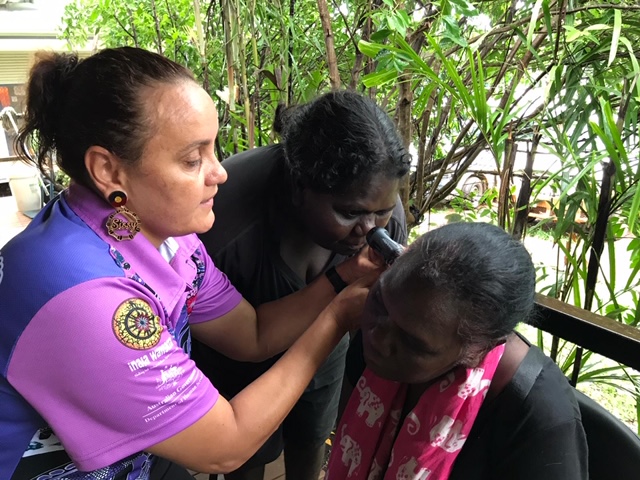Media Release
From: Menzies School of Health ResearchA new community-based training initiative is focusing on prevention through early detection of ear issues in young children.
Up to nine in every ten Aboriginal and Torres Strait Islander children under the age of three in the Northern Territory, suffer from otitis media, or “glue ear”, in one or both ears. If left untreated this can have a devastating impact on a child’s entire life trajectory.
The Hearing for Learning Initiative will increase early detection of otitis media, by training local community members to become ear experts that support on the ground health and education services. This will decrease the need for fly-in fly-out specialists, reduce the treatment waiting period and create employment opportunities for up to 40 community-based workers in the Northern Territory.
Menzies School of Health Research (Menzies) is currently rolling out the Hearing for Learning Initiative in 20 communities around the Northern Territory. Training is under way in Wurrumiyanga and Kalkaringi.
From the group of trainees in each community, two people will be employed part-time by the clinics as Ear Health Facilitators, working with families and the schools to help kids who might not be hearing well.
Professor Amanda Leach who leads the Menzies Ear Health Research Program says this World Hearing Day (3 March) is an opportunity to recognise that ear disease and hearing loss is a big problem in Northern Territory communities.
“It affects language development, school attendance and learning in the class room. Children with hearing loss can’t hear their parents or friends, they become socially isolated and there is some evidence they are more likely to be maltreated. There is also evidence that shows a lot of people in jail have hearing loss.
“The Hearing for Learning Initiative aims to show that training community members on country builds on their knowledge of their people, language and culture, and is the best approach to facilitating primary health care and to complementing specialist fly-in fly-out services,” says Prof Leach.
Visiting expert Claudette “Sissy” Tyson, an Indigenous ear health research officer from the Inala Indigenous Health Services, is working for Menzies to help deliver training at Wurrumiyanga. Ms Tyson says having Indigenous health workers from community in community leads to better health outcomes and better connection within community.
“We spend time teaching community members how to do ear screening, which is looking in the ears with ear equipment and showing them on the computer the inside of the ear, testing hearing with earphones and a mobile phone, and working with the community to educate about ear health and detect ear health issues,” says Ms Tyson.
The Hearing for Learning Initiative is a stepped-wedge trial that will deliver and evaluate training and employment in 20 communities around the Northern Territory over the next two years - Gunbalanya and Katherine are next.


